Everybody knows that eating fruits and vegetables is good for their health because almost all fruits and vegetables are full of healthy nutrients. But can dogs eat vegetables and fruits? If yes, then what are the best fruits and veggies for our pups?
Yes, dogs can eat fruits and vegetables but not all of them. Some fruits and veggies are considered healthy for dogs, such as mango, banana, cauliflower, carrots, etc. On the other hand, some fruits and vegetables are toxic for dogs, including avocados, corn, beans, etc.
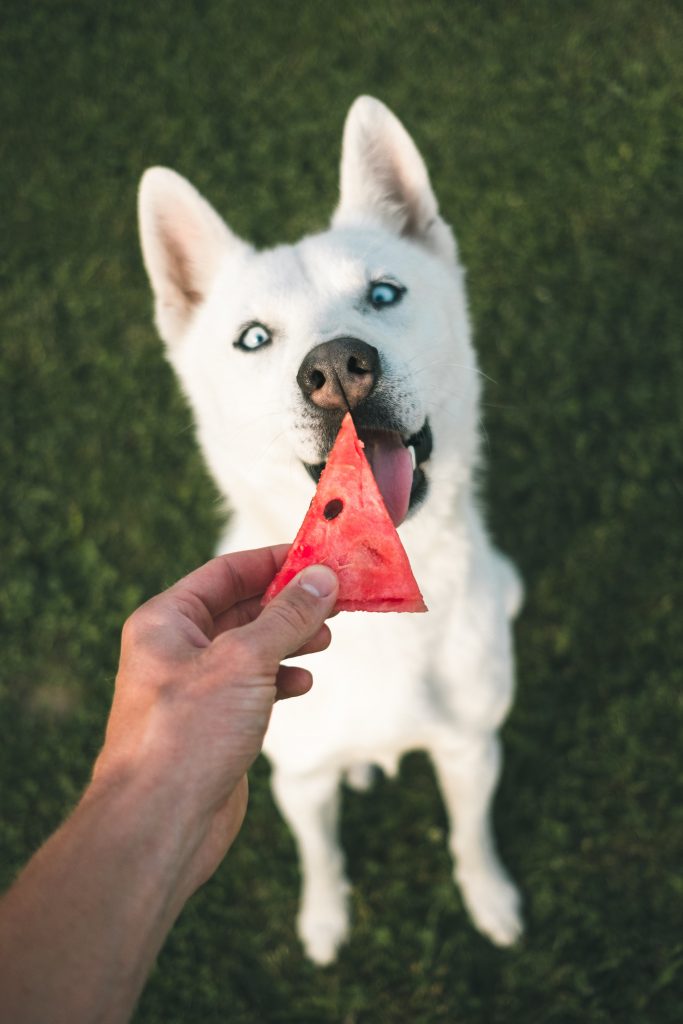
So, try to offer healthy fruits and veggies in your dog’s diet and avoid the toxic ones. Healthy fruits and veggies are also good for dogs to eat because they add water or extra nutrients. Generally, fruits and veggies can be given to dogs daily or weekly, but they shouldn’t account for more than 10–20% of their total diet.
Continue reading this post to discover which fruits and vegetables you can offer your dog and which should be avoided.
Can Dogs Eat Vegetables?
Dogs and humans consume their veggies in very different ways. Vegetables offer a significant amount of nourishment to human beings. They don’t provide much nutrition for pups and aren’t always needed in their diets. Therefore, just 20 percent of your dog’s food should consist of fresh fruits and vegetables.
Pups eat meat and protein because they are carnivores. However, a dog might benefit significantly from the occasional serving of veggies or fruit.
How to Offer Vegetables to Your Dog?
Certain veggies, including asparagus, mushrooms, bell peppers, and garlic, must be prepared before being served. This will keep your canine companion from getting sick and help him get the most nutrition out of his vegetables. Because of this, it is highly essential to conduct research on each unique meal before giving it to your dog. On the other hand, some guidelines should be applied consistently to all veggies.
First, veggies should make up 10% of your dog’s diet. Always choose organic options when purchasing veggies. This will limit the quantity of pesticides in the food your dog eats, which will assist in maintaining his health.
Before you give your dog any veggies, you should either mush them or briefly steam them. The digestibility of the food will improve as a result, allowing your dog to take in more nutrients. Your pup won’t be able to digest the vegetables well if you leave them raw and in big chunks.
And start slowly with new vegetables. Keep an eye out for any signs of gastrointestinal distress in your dog. If things keep going well, you can keep raising the amount.
Best Vegetables for Dogs
Carrots
Carrots are regarded as one of the healthiest vegetables for people and their canine companions. Your dog will benefit from the minimal fat and calories provided by carrots.
Carrots include fiber, which helps to prevent diarrhea by causing stools to become less watery. Carrots, rich in the antioxidant beta-carotene, benefit one’s eyesight. The vitamin A found in carrots can help strengthen your pet’s immune system. To get the most nutrition from a carrot, you should boil it. As with most veggies, dogs do not readily digest vegetables.

Cauliflower
Cauliflower is loaded with nutrients that benefit your dog’s eye, liver, and muscular health because sulforaphane can enhance your dog’s immune system and prevent cancer and other ailments.
However, similar to the use of other cruciferous vegetables, moderation is key. Consuming an excessive amount may result in bloating and digestive distress.
Broccoli
Broccoli is healthy for dogs when given in moderate amounts. If you decide to feed your canines broccoli, you should keep a close eye on them as they consume it. The broccoli stalks can produce a blockage in the esophagus.
Celery
Have you heard that celery is an excellent remedy for bad dog breath? In addition to this, it is known to be effective against cancer and has the necessary nutrients to support the maintenance of a healthy heart. Vitamins A, B, and C may be abundant in celery.
Cucumbers
Cucumbers are great for pups because they have almost no carbs, fat, or oils. Because they are rich in vitamins K, C, and B1, as well as potassium, copper, magnesium, and biotin, cucumbers are great for increasing a dog’s overall energy level.
Green Beans
No matter how you serve them, chopped, steamed, raw, or in a can, they are safe for canines as long as they are served plain. Green beans are an excellent source of essential vitamins, minerals, and fiber, although they have very few calories.
The versatility of green beans means that your canine companion may enjoy them in three preparations: raw, steaming, or even tinned. You should ensure they are the low-salt variety if feeding them from a can. A good snack option that is low in calories is green beans.
Mushrooms
There are healthy mushrooms for dogs besides wild mushrooms. These edible mushrooms are high in prebiotics, which are soluble fibers that provide food for the good bacteria that are already present in your pup’s digestive tract. This strengthens your dog’s immune system and helps him maintain a healthy microbiota in his digestive tract.
Beta-glucan is another potent component that may be found in some types of mushrooms. Mushroom beta-glucan contains immune-boosting and anti-tumor effects. Kennel cough, cancer, and maybe many more ailments can be avoided this way.
Raw mushrooms, however, should never be consumed since they might be harmful or cause discomfort. Never season them before you cook or dehydrate them.
Pumpkin
Pumpkin and squash are two examples of vegetables that may be fed to canines. They are a good source of dietary fiber in addition to several antioxidants such as beta-carotene. Fiber helps move food along in the digestive system. Good solution for their tummy aches.
Pumpkin is soft and simple to digest but has a higher sugar content than most other vegetables, so eating it in moderation is essential. In addition, the benefits of the pumpkin for your dog extend beyond the flesh of the pumpkin. Pumpkin seeds are an excellent natural treatment for worms.

Zucchini
The delicious and nutritious vegetable zucchini is packed with an abundance of antioxidants, vitamins, and minerals. Because of this, they are an excellent option for dogs. They can be especially beneficial for dogs that are overweight or have problems with their stomachs.
Bitter zucchinis have a component in them called cucurbitacin, which is known to be poisonous to canines. Buy organic zucchinis and sample one before giving it to your dog to prevent cucurbitacin.
Best Fruits for Dogs
Apples
Apples are rich in vitamins A and C and are also an excellent source of fiber, which can assist in regulating the dog’s bowel movements.
Always remove the core and the seeds from the apple since they contain substances that are harmful to pups. Because they are low in protein and fat, they are an ideal treat for dogs of all ages, especially seniors. You may serve frozen apples or put them on your pup’s meal.
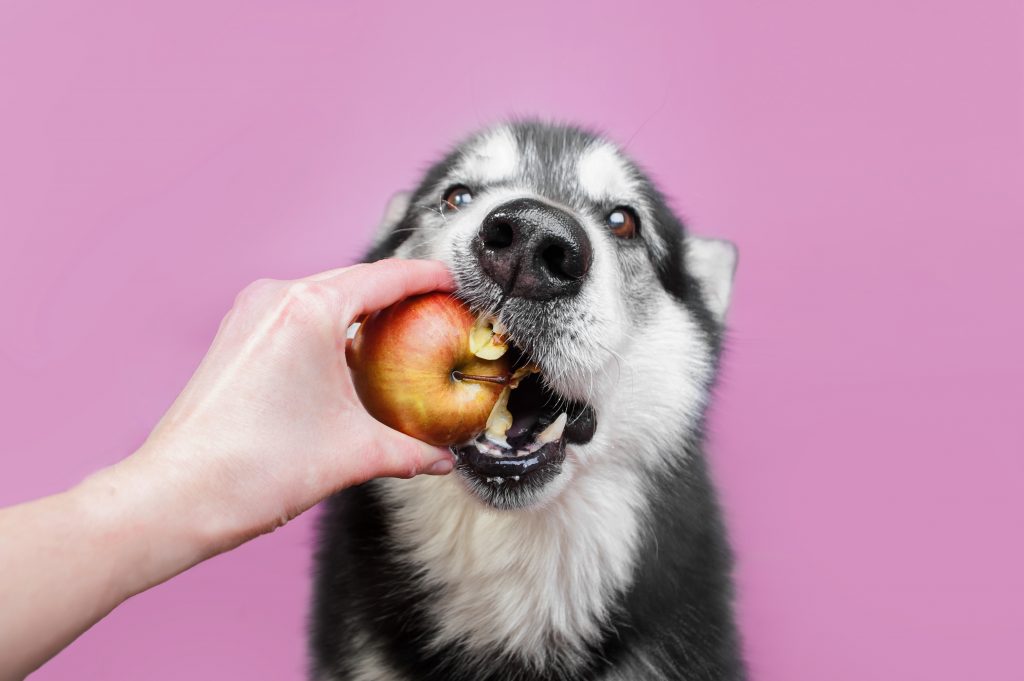
Oranges
If your dog eats them, oranges are a healthy treat for them to enjoy. Many dogs have such a severe sensitivity to the scent of citrus that they practically turn their noses up at it and refuse to eat it.
Mango
Before giving your dog mango, you should cut it in half and remove the pit, just like an apple. The pit is unsafe for your pets since it is contaminated with cyanide. This delicious fruit contains various vitamins, including A, B6, C, and E.
Peaches
Dogs can eat a small portion of peaches. They are loaded with vitamin A, which can assist in the defense against infections. It is necessary to get rid of the pit since it is poisonous. You should avoid canned peaches because they have a lot of sugar. Peaches from an organic source are the healthiest option for our four-legged pals.
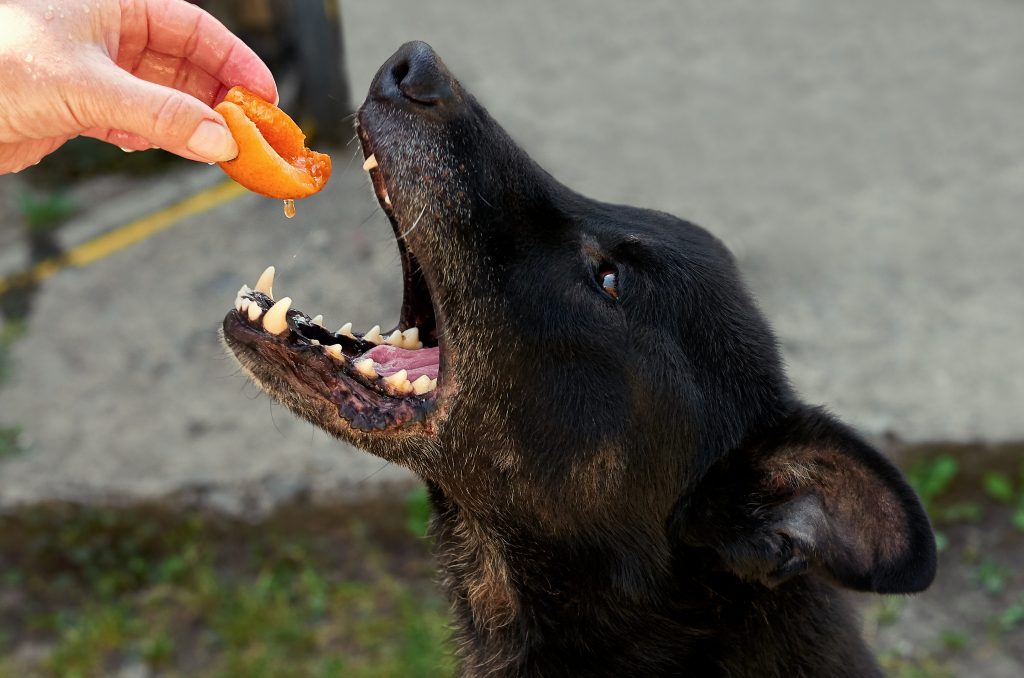
Bananas
During the afternoon, bananas are an excellent treat for pups. In addition, they are delicious snacks that are low in calories while still being rich in potassium, vitamins, biotin, fiber, and copper.
Bananas are low in cholesterol, and salt further contributes to their status as an ideal sweet. Bananas contain a lot of sugar; therefore, they shouldn’t be a regular part of their diet. Instead, they should be given to them as a special treat once in a while, but only in small amounts.
Strawberries
Strawberries are just as healthy for your dog as they are for you. Antioxidants, fiber, and phytochemicals may be found in abundance in Strawberries. Because they protect against cell damage in people and dogs, strawberries are an excellent snack for your pup to enjoy occasionally.
Raspberries
Dogs can consume raspberries, but the amount they get must be less than half a cup. Raspberries have a trace quantity of the natural compound xylitol, which can cause gastrointestinal distress in canines. They are fine, but only in small amounts.
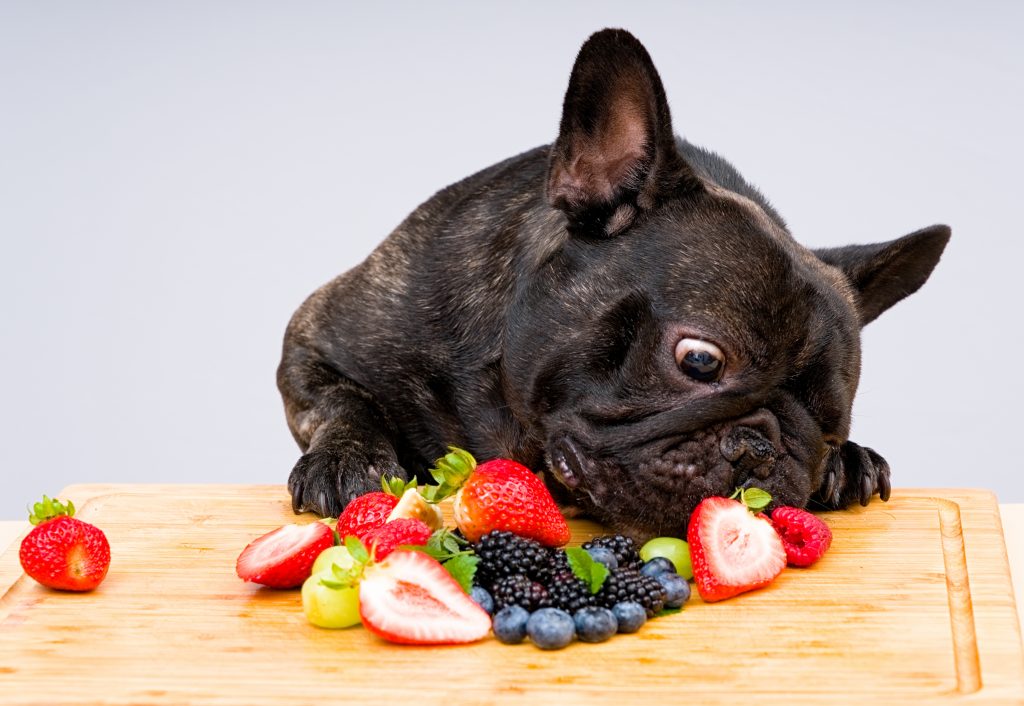
Harmful Vegetables and Fruits To Pups
Now that you know safe veggies and how to feed them, let’s look at those to avoid.
Corn
Corn isn’t poisonous and has some nutritional benefits. However, corn also contains starchy carbohydrates, which are unnecessary for dogs’ diets. If you wish to give your dog corn, you must choose corn grown using organic methods.
And remember, if you want to offer your dog corn as a treat, never feed your dog corn on the cob. Corn cobs provide a risk of choking and may produce clogs, both of which can result in illness, the need for surgery, or even death.
Beans
Beans, a type of legume, are high in protein, so they are often added to processed kibble. Beans aren’t suitable for dogs; thus, this might mislead owners.
In addition, beans have a high starch content, which contributes to the development of many illnesses or makes their symptoms worse. In addition, starch provides a source of nourishment for the pathogenic bacteria and yeast that reside in your pup’s digestive tract.
Onions
Onions contain a substance known as N-propyl disulfide, a chemical linked to the development of hemolytic anemia in dogs. Your dog’s body will begin to fight against its own red blood cells because it believes they are foreign invaders. This will prevent the red blood cells in your dog’s body from carrying oxygen throughout its system, which can be fatal.
Potatoes
Potatoes, much like maize, are a type of starchy carbohydrate that your canine companion does not require to live. Also, starchy carbohydrates feed dangerous bacteria in your dog’s stomach and promote cancer cells. Your dog might become sick from eating genetically engineered potatoes or potatoes treated with glyphosate. Avoid feeding your dog potatoes and choose from the wide variety of healthy veggies for canines.
Avocados
Avocados are toxic to dogs due to the presence of a chemical called persin, which can cause them to throw up, have diarrhea, and retain fluid around the heart. According to reports, the pit of avocado has an extremely high concentration of a chemical that, if consumed, can be harmful. So please do not share your avocado toast with your pups.
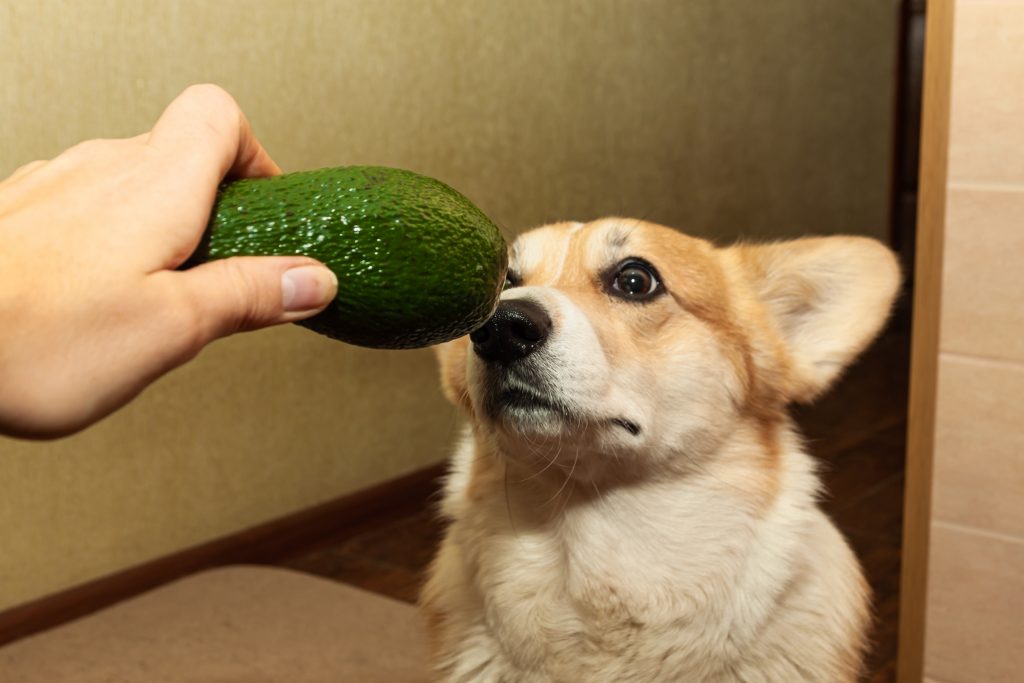
Conclusion
Feeding your dog permissible fruits and vegetables, such as apples, bananas, blueberries, peaches, cauliflower, etc., is an easy way to ensure they receive all the essential nutrients they require. So, try to offer healthy fruits and veggies to your canine companions occasionally.
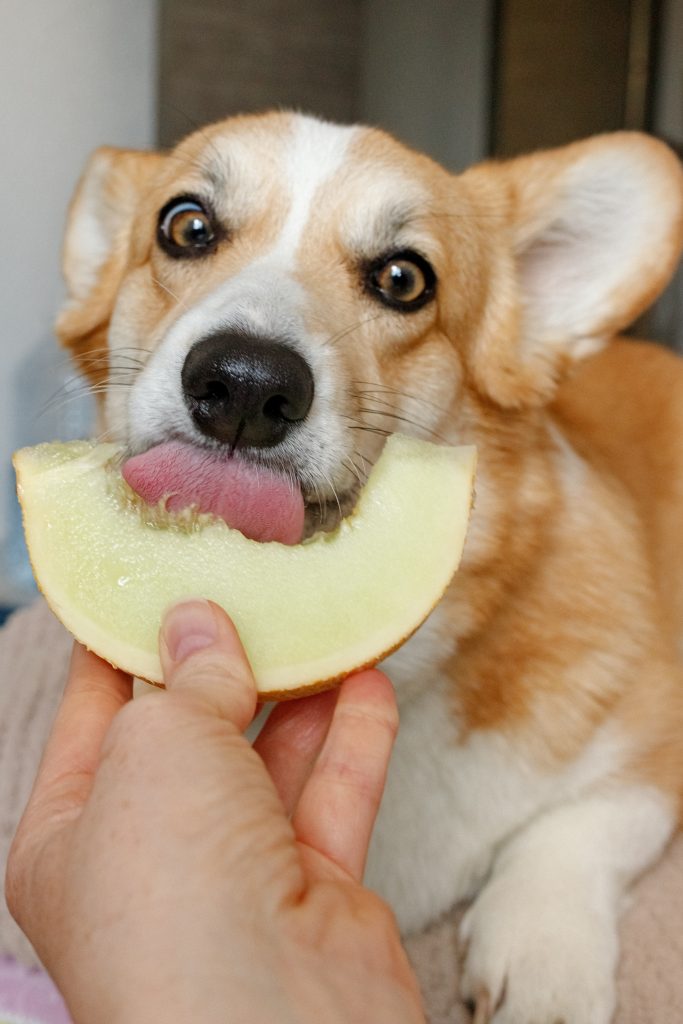
References
- https://repository.up.ac.za/handle/2263/33074
- https://www.guavafacts.com/can-dogs-eat-apples/
- https://www.frontiersin.org/articles/10.3389/fvets.2016.00026%20/full
- https://www.dogsnaturallymagazine.com/10-reasons-to-feed-vegetables-for-dogs/
- https://www.cambridge.org/core/journals/public-health-nutrition/article/performance-of-a-short-tool-to-assess-dietary-intakes-of-fruits-and-vegetables-percentage-energy-from-fat-and-fibre/51ED1E16F05A7ACC083E5A2B1CAAEDE0
- https://www.dogsnaturallymagazine.com/are-strawberries-good-for-dogs/
- https://wagwalking.com/wellness/what-veggies-and-fruits-can-be-supplementary-to-dogs-daily-meals
- https://www.bluecross.org.uk/advice/dog/can-dogs-eat-apples-grapes-potatoes-and-other-fruit-and-veg

